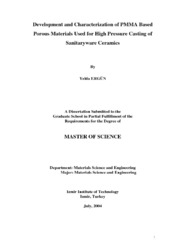Please use this identifier to cite or link to this item:
https://hdl.handle.net/11147/4042| Title: | Development and Characterization of Pmma Based Porous Materials Used for High Pressure Casting of Sanitaryware Ceramics | Authors: | Ergün, Yelda | Advisors: | Tanoğlu, Metin | Publisher: | Izmir Institute of Technology Izmir Institute of Technology |
Abstract: | The ceramic whiteware / sanitaryware industry is rapidly undergoing to implement high-pressure casting techniques for ceramic article production. In high pressure technique, porous materials with open cell microstructure that allow drainage of water from the ceramic suspension under applied pressure are needed. In addition, a relatively high mechanical performance of the porous structure is required to obtain a long service life from the material under the cycled high pressures. The polymethyl methacrylate (PMMA) based polymeric porous structures have become the most suitable type of materials for this purpose because of their short casting periods and high service lives. The superior service life and performance of these materials are closely related to their microstructure. In the present study, PMMA-based porous materials were produced by water-in-oil emulsion polymerization technique. The porous systems were produced with various compositions of the constituents in the emulsion and various filler sizes to investigate the effect of the constituents and the sizes on the microstructure of PMMA-based materials. The variations on the pore microstructure were related to the performance of the material. The pore morphology and porosity of the samples was investigated using optical and scanning electron microscopy techniques (SEM). Water permeability was measured using a custom made permeability apparatus. The mechanical properties such as compressive collapse stress and elastic modulus values were determined by performing mechanical compression tests. It was found that increasing water surfactant concentration increases the porosity, water permeability and decreases mechanical properties and reversely increasing the amount of monomer in the emulsion decreases the porosity, water permeability and increases the mechanical properties. Fracture toughness values of the materials were measured by using single edge notch three point bending (SENB) test method. Fracture toughness test results and fracture surface analysis show that materials are fractured in brittle manner. It was found that lower concentrations of water and higher concentrations of monomer result in thicker cell walls and improve the fracture toughness of the material. To investigate the residual mechanical properties, specimens were subjected to cyclic loadings. After cyclic loading, increase of elastic modulus with the percentage of 52 and decrease of collapse stress values were measured. | Description: | Thesis (Master)--Izmir Institute of Technology, Materials Science and Engineering, Izmir, 2004 Includes bibliographical references (leaves: 59-61) Text in English; Abstract: Turkish and English xi, 61 leaves |
URI: | http://hdl.handle.net/11147/4042 |
| Appears in Collections: | Master Degree / Yüksek Lisans Tezleri |
Files in This Item:
| File | Description | Size | Format | |
|---|---|---|---|---|
| T000513.pdf | MasterThesis | 2.86 MB | Adobe PDF |  View/Open |
CORE Recommender
Page view(s)
432
checked on Jun 16, 2025
Download(s)
466
checked on Jun 16, 2025
Google ScholarTM
Check
Items in GCRIS Repository are protected by copyright, with all rights reserved, unless otherwise indicated.